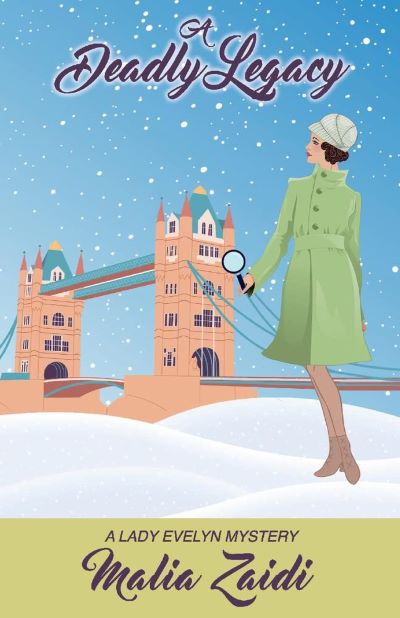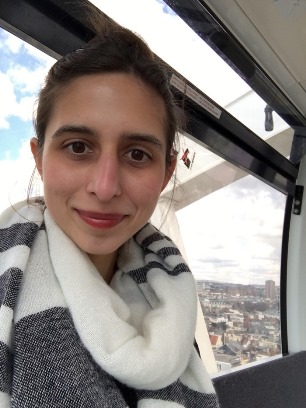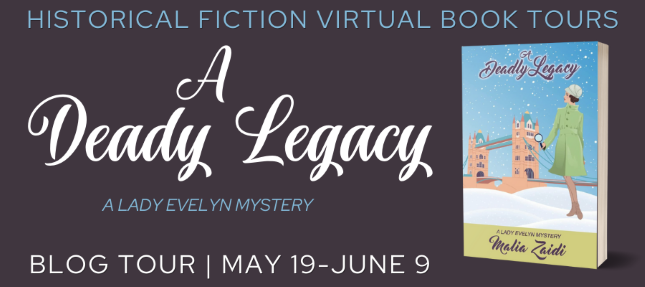A Deadly Legacy by Malia Zaidi

A few months after the Carlisle Detective Agency opened its doors, Lady Evelyn and her partner, Hugh, are twiddling their thumbs. The cases are slow to trickle in, leaving the detectives feeling uninspired. So, when Evelyn's Aunt Louise asks her to join the local chapter of the Women's Institute, she has no excuse to decline the invitation. Yet what she expects to be a tedious gathering, turns out to be anything but. She meets former suffragettes and outspoken women, eager for change, forcing Evelyn to reexamine her own prejudices. A decidedly less welcome surprise is the body she comes across only a few days later. Evelyn need hardly be a professional detective to recognize a murder when she sees one. Amid planning her wedding and navigating family affairs, she sets out to solve the case. The investigation takes Evelyn and Hugh into the past, examining the war years, which left the present far from untarnished. Is the victim's history connected to her death? Could her involvement in the war have given someone a motive for murder? The questions pile up, and Evelyn and Hugh must race against the clock to discover the truth, before more lives are lost, not least, their own…
Amazon | Barnes and Noble | Books-a-Million | IndieBound | Target | Walmart
“Ladies, welcome, how good of you to come. I have badgered a number of women in my acquaintance to join us today. May I introduce Miss Juliet Nelson.” Edith nods at the woman standing beside her. She is pale and almost painfully thin with high cheekbones and watery blue eyes. We are standing in the broad hall that houses the WI. Women’s voices echo from the tall ceiling and the general atmosphere is one of joviality
“Evelyn Carlisle. Lovely to meet you,” I introduce myself, and Louise echoes the sentiment. Miss Nelson’s clothing is plain, though well made, and she wears not a scrap of jewelry, which lets her appear younger than she may be, nearer my age than that of her host.
“And you,” she answers in a low voice, deeper than I had expected.
“My daughter, Adeline, will be around somewhere,” Edith continues, turning her head this way and that, seeking out her daughter in the crowd of women. I must say, I am surprised by the energy in the room. I always assumed these institutes were all about cooking jam and teaching ladies how to knit. My ignorance does me no credit, I realize. One wall of the large room is adorned with posters advocating women’s liberty and ladies of all ages are milling about, chatting and breaking into groups. I am not certain what role I am meant to play. Edith and Louise have turned away, chatting to another woman in a bright orange dress and I feel ill at ease, too conspicuous in my ambiguity.
“Are you new to the WI, Miss Carlisle?” Juliet Nelson asks softly. I hardly noticed she was still standing beside me and startle at her voice.
“Oh, yes. Yes, I am. My aunt and Edith are old friends, and she invited us along. I confess, I am not sure what to do.”
“I feel much the same. I received an invitation in the post.” She gives me a little smile, merely a tug of the corner of her mouth really, as if the muscles are ill-used to the exercise.
“I think my aunt didn’t want to arrive alone.”
“As someone who did, I cannot blame her.”
“Do you live in the area?” I ask, trying to keep the conversation alive, but sensing she will not contribute much without prompting.
“Not far, yes. And you?”
“I live in St. James and have my business there, too.” She raises an inquisitive brow, which I take as encouragement to elaborate on the nature of said business. The way parents are always keen to expound on their children, I need little prompting to discuss The Carlisle Detective Agency. The flicker of a smile reappears, and this time it seems to reach her pale blue eyes.
“A detective agency, that sounds a fascinating endeavor. Too exciting for me, though.”
“Oh, I do not know about that.” I explain the rather tame nature of our current caseload.
“All the same,” she insists with a small shake of the head. Moments later, we are interrupted and drawn into a group which now includes Edith’s daughter, Adeline Markby, a cheery-faced woman a few years my senior with a head of chestnut curls and a heart-shaped face. Two rosy spots color the apples of her cheeks, matching the color of her suit, a bright magenta with overlarge buttons. She is the picture of a frivolous society lady, and yet she is here and well-liked and respected. I wonder what the regulars of the WI think of me? Perhaps they view me with the same skepticism with which I view Adeline? I give myself an inward kick to set judgement aside. My uncharitable attitude stems from the fact that I do not feel at ease. I am itching to return to the office and feel guilty for hoping an intriguing case has presented itself in my absence.
We congregate around a large table, and two women press cups of tea into our hands as Edith commences with the meeting. Plans for an upcoming fundraiser are discussed, and I vaguely register Louise volunteering our services to host a luncheon in the near future as well as organizing a trip to Covent Garden to distribute food on Armistice Day.
“Your aunt is taking to our group rather well, isn’t she?” Adeline whispers, nudging me gently.
“Indeed, she is always very capable when she has a cause.”
“You seem as though you do not quite believe in the WI’s work?”
“Do I? I must apologize,” I stammer quickly, aware that she has read genuine skepticism in my manner. “I suppose, well . . .”
“You think it all rather dull?” There is a twinkle in Adeline’s eyes telling me she does not mean to chastise.
“Not dull, so much as limited, perhaps. My work took me to the East end earlier this year. I saw true squalor, people struggling. Women struggling. I wonder whether the business of teaching how to knit and run a home is the best we can do for women.”
“Then you do not know very much about the WI, Lady Carlisle,” again Adeline’s tone is not critical, so much as eager.
“Probably not, but all this talk of fundraising and holding workshops strikes me as a step removed from more critical work to be done for women in this city. Many are still illiterate, others work in factories only to have their men drink away their earnings.”
“Teaching women independence can begin with simple tasks such as teaching them to run a home.”
“Certainly, it can,” I acknowledge, already regretting my moment of assertion. It is not my intent to disparage the work of this institute, for good evidently comes out of it. My mind often returns often to what I saw in Whitechapel earlier this year. Although I have since contributed to charities aiding the desperately poor, I still wonder how to help beyond simply supplying coin.
“I have been to the soup kitchens in Seven Dials, Lady Carlisle. Something must be done, I agree, yet we must simply start somewhere, and for me the WI is that somewhere.”
“You speak more wisely than I, Adeline,” I concede and offer her a smile. Despite the fact that I am still uncertain how to be of use here, I understand the meaning of her words perfectly. We must start somewhere. I hoped taking in Maeve and her family and finding a position for the widow I met in Whitechapel last year were solid beginnings, but there are countless more women who live a life weighed down by the burden of perpetual destitution. When I glance around the room I see clean faces, not drawn taut by worry and hunger, but even here, I cannot see beyond their surface. My last case taught me that anyone, even women of the highest social standing, can carry the weight of the world on their shoulders. I should not dismiss the work of the Women’s Institute too easily, Adeline is right. For the first time this morning, I am glad Louise asked me to come today.
ABOUT THE AUTHOR

Facebook | Twitter | Instagram | Goodreads
Blog Tour Schedule
Thursday, May 19Review at Passages to the Past
Monday, May 23
Excerpt at Heidi Reads
Friday, May 27
Excerpt at The Caffeinated Bibliophile
Monday, May 30
Guest Post at The Cozy Book Blog
Tuesday, May 31
Review at Gwendalyn's Books
Thursday, June 2
Guest Post & Excerpt at Older & Smarter
Saturday, June 4
Review at History from a Woman’s Perspective
Monday, June 6
Excerpt at bookworlder
Thursday, June 9
Excerpt at Coffee and Ink
Giveaway
Enter to win all 6 books in the Lady Evelyn Mystery series!Book One: A Poisonous Journey
Book Two: A Darker Shore
Book Three: The Study of Silence
Book Four: The Golden Hour
Book Five: The Quality of Mercy
Book Six: A Deadly Legacy
The giveaway is open to the US only and ends on June 9th. You must be 18 or older to enter.
A Deadly Legacy


No comments:
Post a Comment